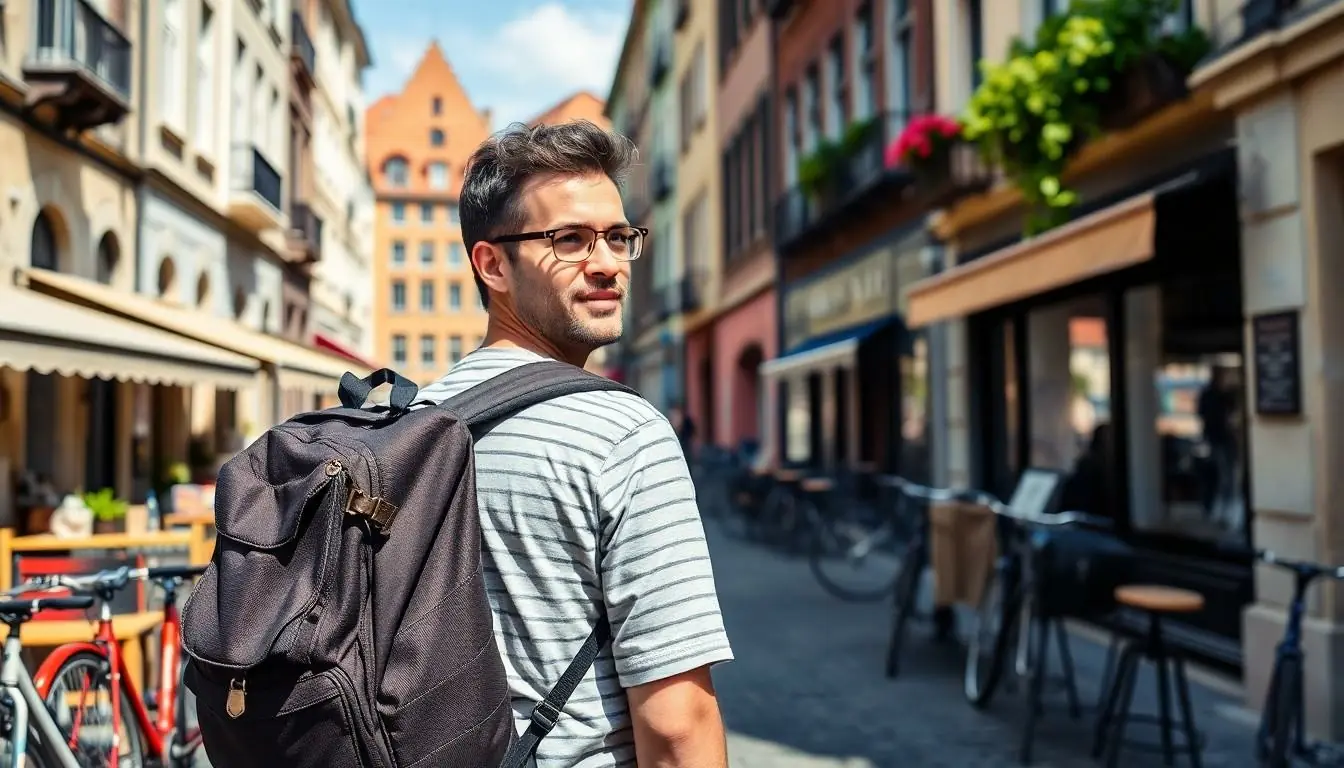Planning a trip to Europe? Get ready for a whirlwind of history, culture, and enough carbs to fuel a small army. But before you start packing your bags, there are a few travel tips that could save you from the common pitfalls that turn dream vacations into chaotic adventures.
Table of Contents
ToggleEssential Europe Travel Tips
Traveling through Europe requires thoughtful planning and awareness. These essential tips ensure travelers maximize their experiences.
Planning Your Itinerary
Create a flexible itinerary that allows for spontaneity. Prioritize major attractions in each destination while leaving gaps for exploration. Research local events and festivals to enhance cultural immersion. Group nearby cities to minimize travel time, allowing for more leisure activities. Utilize travel apps for real-time updates on transportation options, language tips, and dining recommendations. Allocate time for rest and self-discovery in each location. This approach fosters a balance of sightseeing and relaxation.
Best Times to Visit
Consider visiting during shoulder seasons, late spring and early fall, for fewer crowds and pleasant weather. December brings festive holiday markets, while summer offers vibrant city events. Prices may rise during peak season, impacting accommodation and attractions’ costs. Certain attractions, like museums, can implement time-specific admissions. Booking travel and accommodations in advance can yield better deals. Each region in Europe has unique weather patterns, affecting activities. Knowledge of local climate helps pack appropriately and enhances the overall experience.
Budgeting for Your Trip

Budgeting plays a crucial role in planning a European adventure. Understanding costs helps travelers maximize their experiences without overspending.
Cost-effective Travel Options
Finding economical transportation is vital for budget-conscious travelers. Trains often provide scenic routes and competitive pricing across many countries. Consider booking tickets in advance for discounts. Buses serve as another affordable choice, particularly for longer distances. Budget airlines operate numerous routes, allowing flexibility and cost savings. Use apps to compare prices and discover the best deals. Incorporating walking or biking into city exploration also reduces travel expenses while enhancing the experience.
Accommodation Tips
Securing budget-friendly lodging can significantly lower overall trip costs. Hostels offer shared accommodations at lower rates, ideal for socializing and meeting fellow travelers. Consider vacation rentals, which often include kitchens for preparing meals. Look for hotels that provide free breakfast to save on dining expenses. Utilizing platforms that specialize in last-minute deals may uncover unexpected bargains. Negotiating prices directly with hotel managers can yield better rates, especially during off-peak seasons.
Navigating Europe
Traveling through Europe requires smart planning and awareness of transportation methods. Various options exist to move between cities and explore regions efficiently.
Transportation Choices
Trains offer a swift and scenic way to travel, connecting major cities seamlessly. Buses provide an affordable alternative, often reaching destinations trains don’t. Flights may be useful for longer distances between countries, as budget airlines frequently operate routes. Renting a car allows for flexibility and exploration of rural areas at one’s own pace. Travelers can also consider ride-sharing services for convenience. Each option presents unique benefits, so priority lies in matching the mode of transport to the travel itinerary and personal preferences.
Understanding Public Transport
Public transportation systems in cities like Paris, London, and Berlin are reliable and user-friendly. Metro systems excel at quickly traversing urban landscapes, making it easy to reach attractions. Buses and trams augment service, providing comprehensive coverage. Understanding ticketing systems is crucial; often, day passes offer significant savings for frequent travelers. Many cities also provide apps for navigation and schedule information, simplifying journeys. Familiarizing oneself with local transport during the trip enhances the overall experience and minimizes travel time.
Cultural Insights
Cultural awareness enhances the travel experience in Europe. Understanding local customs and language can lead to more authentic interactions.
Language Tips
Learning basic phrases in the local language improves communication. Simple greetings and polite expressions, such as “hello” and “thank you,” show respect for the culture. Many Europeans appreciate travelers making an effort with their language. Language apps can assist with translation and pronunciation. Additionally, using non-verbal cues can bridge communication gaps when words don’t suffice.
Local Etiquette
Familiarity with local etiquette matters. For instance, dining customs differ across countries; in France, finishing everything on the plate signifies enjoyment. Tipping practices vary as well, so awareness of norms helps avoid misunderstandings. Punctuality holds importance in Germany and Switzerland, while relaxed attitudes towards time exist in Spain and Italy. Greetings often include a firm handshake; in some regions, a kiss on the cheek is customary among acquaintances. Observing local behaviors fosters positive interactions and enriches the travel experience.
Safety and Health
Traveling in Europe requires attention to safety and health considerations for a smooth experience.
Travel Insurance Advice
Obtaining travel insurance is essential for a worry-free adventure. It covers unexpected events like illness, trip cancellations, or lost luggage. Many providers offer plans tailored to individual needs, ranging from basic coverage to more comprehensive options. Always read the terms carefully, ensuring that emergency medical expenses are included. Check if adventure activities are covered in the policy. For added peace of mind, carrying proof of insurance while traveling provides reassurance against unforeseen situations.
Staying Safe Abroad
Safety should remain a priority while exploring new destinations. Pay close attention to surroundings, especially in crowded tourist areas. Using common sense like avoiding poorly lit streets at night makes a difference. Keeping valuables secure and minimizing exposure to pickpockets reduces risks significantly. Local authorities, such as police or tourist information centers, offer guidance and assistance when needed. When possible, share itineraries with friends or family for an added safety net. Staying connected through local SIM cards or Wi-Fi ensures easy communication.
Conclusion
Traveling through Europe can be a transformative experience filled with adventure and discovery. By applying the right tips and strategies, travelers can navigate the continent with ease. Embracing flexibility in itineraries while prioritizing must-see attractions allows for both planned exploration and spontaneous joy.
Understanding local customs and budgeting wisely enhances the experience and makes it more enjoyable. Whether it’s utilizing public transportation or finding unique accommodations, every decision contributes to a memorable journey. With a bit of preparation and an open mind, anyone can create unforgettable memories on their European adventure.




